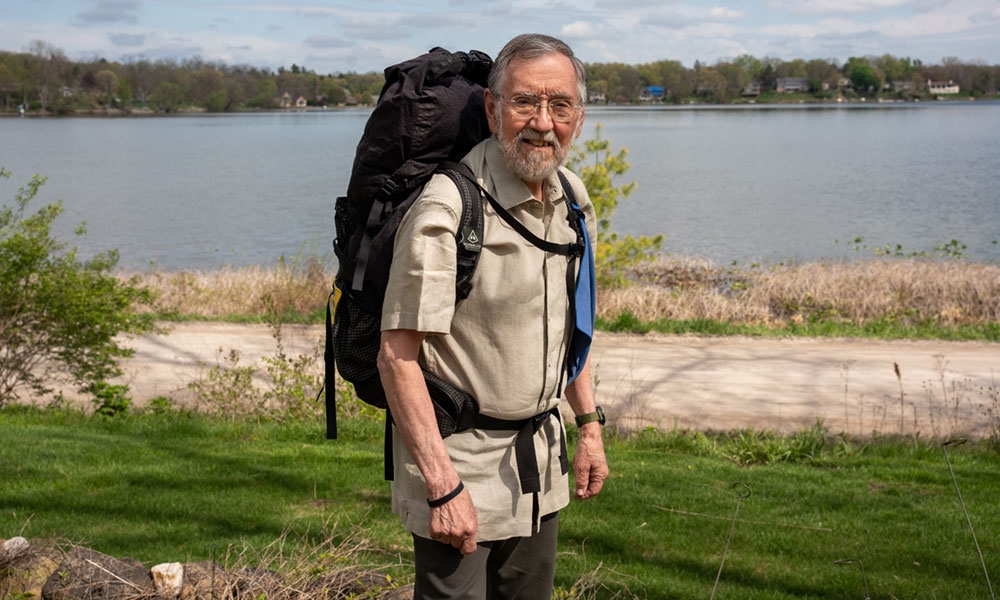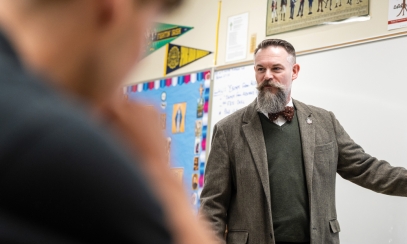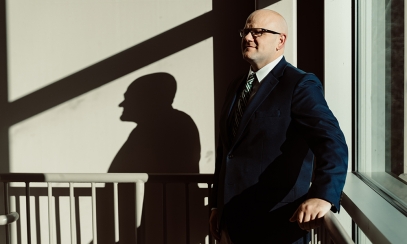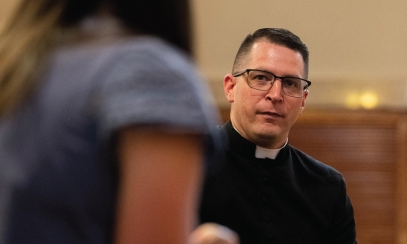
A pilgrimage of peace
Getting your Trinity Audio player ready...David Larwa first made a pilgrimage across Spain’s Camino de Santiago – the Way of Saint James – back in 2016. Like all pilgrims on the Camino, his destination was the tomb of Saint James the Apostle, but David was also seeking something else: peace. “Everyone has issues in their lives,” reflects David who is a parishioner at Saint Patrick in Brighton, “I’ve had anxiety and depression.” In the years since, David has walked the 500-mile pilgrim route to Santiago eight more times. “I’m a better Catholic now. The Camino has given me something, I’ve come out the other end and I’m at peace.”
David Larwa first made a pilgrimage across Spain’s Camino de Santiago – the Way of Saint James – back in 2016. Like all pilgrims on the Camino, his destination was the tomb of Saint James the Apostle, but David was also seeking something else: peace. “Everyone has issues in their lives,” reflects David who is a parishioner at Saint Patrick in Brighton, “I’ve had anxiety and depression.” In the years since, David has walked the 500-mile pilgrim route to Santiago eight more times. “I’m a better Catholic now. The Camino has given me something, I’ve come out the other end and I’m at peace.”
Remembering his first pilgrimage as much more challenging than he expected, David recalls a devastating start to the trip. “We were just three days in when my wife Lizzy fell and broke her arm.” When doctors told Lizzy she could not continue on, the couple had to decide whether they would both return home. “We were up at 3 a.m. after they set her arm at the hospital, and Lizzy told me that I had to finish the Camino. We both cried.” Although not the trip he had planned, David says that walking alone was life-changing. “What I remember was the kindness that people showed to me. I have a picture of a group of eight of us in Santiago in front of the cathedral and in the group there was a teacher, a priest, and a drug addict. Every one of them played a role in my walk.”
Upon completing the Camino in Santiago de Compostela and arriving at the cathedral where St. James is buried, pilgrims receive a Compostela certificate noting their accomplishment. Despite his many Compostelas, David says he’s received much more than certificates from his journeys. Most notable for David are the spiritual graces. “The comfort that you get from churches is remarkable,” he notes. “Every night, I go to Mass. I’ve been in the middle of nowhere in a church and at the end of Mass the priest invited pilgrims up and one by one he laid hands on people and prayed over them. People cried as we experienced the power of presence.”
While thousands of pilgrims from around the world walk the Camino every year each for varying reasons, David says the faith component is undeniable. “At its core, it’s biblical. Jesus walked, Abraham walked, Moses walked, the three wise men walked.” Yet one biblical figure stands out to David and is of particular interest to him: the apostle James. “I’ve read probably 50 books about him. I want to know it all. Here was this 5’6” Palestinian Jew in the year 30 who knew Jesus. He was there when Jesus healed Jarius’ daughter, and he was there for the Transfiguration and in the garden. I have a composite picture in my mind of what he looked like, and I try to relive what it would have been like to have been him.”
With gratitude for what he has received through the Camino, and perhaps not done adding to the number of times he’ll walk it, David’s desire to share the experience with others has led him to a role of service. “I am a Hospitalero now. This year, I’ll serve in that role for my fourth time.” As a Hospitalero, David leads a hostel for two weeks, carrying out duties ranging from registering pilgrims to directing them to the nearest Mass and from taking people to the hospital, to cleaning bathrooms and folding sheets. For David, the role is a natural giving back after what he’s received.
As he looks forward, David says he’s not sure what God’s plans entail for his journeys. “It’s hard to realize I’ve reached an age where I maybe can’t walk as much as I used to. And with that comes a hard realization that I’m not infallible.” Yet, David says, the graces remain. “When I listen to the Gospel, I listen to it in a different way than I ever have before. The Camino has given me more compassion for other people. It has made me more present to people and to the world around me. I stop and look at the rocks and the flowers, and there’s something different about the world. Sometimes, I think if I had just taken the bus, none of the experiences I’ve had as a pilgrim would have occured!” Ultimately, David is grateful that, like millions of pilgrims before him and many more to come, God invited him to walk.



